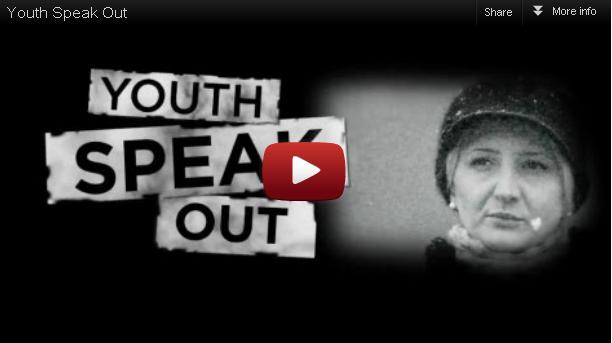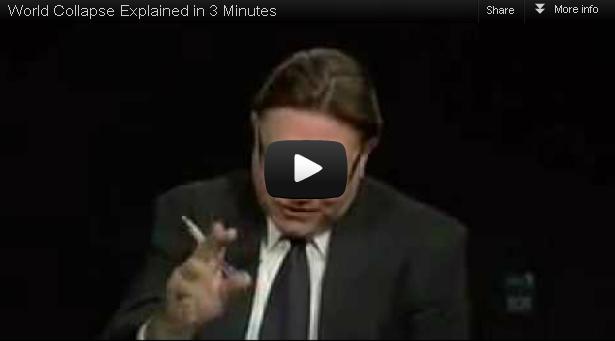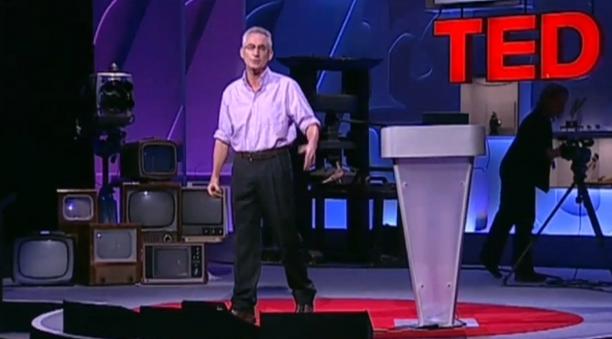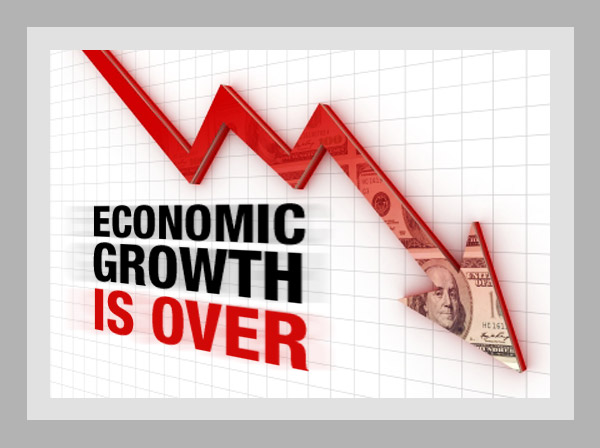


World Economic Collapse Explained In 3 Minutes
A classic, funny skit showing how economically interdependent nations have become, and what a horrific cascade of events happens when everyone tries to make a profit off of one another. …the banking system must continually expand – not necessarily because it is the right (or wrong) thing to do, but, rather, simply because that is how it was designed …the extremely wealthy are saving incredible amounts of money, while at the lower ends the savings rate is deeply negative. Why is this important? Because as the Greek philosopher Plutarch once stated, “An imbalance between rich and poor is the oldest and most fatal ailment of all republics.” – Dr. Chris Martensen, taken from his Crash Course In The 3 Interconnected E’s: Economy, Energy,...
Are Politicians Kicking The Can On Hard Economic Decisions, Or Are They Out Of Options?
Nouriel Roubini, professor at the NYU’s Stern School of Business, and Chairman of Roubini Global Economics, in the Project Syndicate article “Fiddling at the Fire,” describes the precarious, and volatile state the economic and geopolitical world state is in, and challenges today’s leadership in the wake of the deepening global crisis, accusing them of “kicking the can,” avoiding hard decisions and action: Politicians Kick The Can On Hard Economic Decisions When Approaching A Brick Wall In The Economy Ineffective governments with weak leadership are at the root of the problem. In democracies, repeated elections lead to short-term policy choices. In autocracies like China and Russia, leaders resist the radical reforms that would reduce the power of entrenched lobbies and interests, thereby fueling social unrest as resentment against corruption and rent-seeking boils over into protest. But, as everyone kicks the can down the road, the can is getting heavier and, in the major emerging markets and advanced economies alike, is approaching a brick wall. Policymakers can either crash into that wall, or they can show the leadership and vision needed to dismantle it safely…” Is The Reason For Politicians Kicking The Can On Hard Economic Decisions Weak Leadership Or Something Else? Indeed, politicians have their own calculations, they think about their personal legacies, the next elections, what the party line is, what the powerful lobby groups, sponsors want, but in general they are not “evil people” intentionally wanting to destroy the world or their own countries. The Reason For Politicians Kicking The Can On Hard Economic Decisions Is Incomplete Knowledge About The World’s Current Situation The politicians seem weak, they “kick...
A Mutual Approach: Economists And Politicians On The Need For Global Cooperation To Treat The Global Financial Crisis
We’ve got these big problems that require people to take a longer-term view than just their own selfish individual or national interest… We must now reform the international financial system around the agreed principles of transparency, integrity, responsibility, good housekeeping and cooperation across borders.” – Gordon Brown, Former Prime Minister of the United Kingdom, in an interview with Piers Morgan on CNN. Self Interest Gets In The Way Of Cooperation At the London G20 summit on 2 April 2009, world leaders committed themselves to a $5tn (£3tn) fiscal expansion, an extra $1.1tn of resources to help the International Monetary Fund and other global institutions boost jobs and growth, and to reform of the banks. From this point, when the global economy was on the turn, international cooperation started to disintegrate as individual countries pursued their own agendas.” – Larry Brown, The Guardian economics editor, in the article “Global Financial Crisis: Five Key Stages 2007-2011” The Call For Mutual Cooperation, If Limited, Has Not Dwindled We face the most difficult economic conditions in generations. The international community must unite to tackle the downturn and set the path toward a sustainable future… Only by working together can we meet the challenge.” – Alistair Darling, Scottish Labour Party politician, in the article “International Cooperation Is the Way Out of the Financial Crisis” A… new model is needed to acknowledge that we live together in a multicultural, multi-ethnic and multi-religious world. Prevailing values will have to increasingly accommodate diversity with substantial challenges for national and individual identities. We will only make lasting progress by recognizing that we are different but interdependent. Thus, we...
How To Redefine Prosperity To Get Through The Crisis Unscathed
“The credit and debt system … is a story about us, people, being persuaded to spend money we don’t have on things we don’t need to create impressions that won’t last on people we don’t care about.” Tim Jackson, Professor of Sustainable Development at the University of Surrey and Director of the ESRC Research Group on Lifestyles, Values and Environment (RESOLVE), Economics Commissioner on the UK Sustainable Development Commission, and author of Prosperity Without Growth: Economics for a Finite Planet, in his TED talk Economic Reality Check explains the paradox of living in crisis times, the paradox between people’s needs to “save, save, save” and the continuation of an socio-economic influence to “spend, spend, spend,” and suggests a solution of redefining prosperity: for meaningful, altruistic values to spread throughout society in order to achieve a “we” vision of prosperity. Graph: The dramatic rise in personal debt and the plummeting of personal savings in the U.K. the last 15 years before the 2008 financial crash [taken from the TED talk] The Crisis’ Paradox – The Need To Save & The Social Influence To Spend “In the crisis, in the recession, what do people want to do? … They want to spend less and save more. But saving is exactly the wrong thing to do from the system point of view … saving slows down recovery. And politicians call on us continually to draw down more debt, to draw down our own savings even further, just so that we can get the show back on the road, so we can keep this growth-based economy going. It’s an anomaly, it’s a place where the system...
